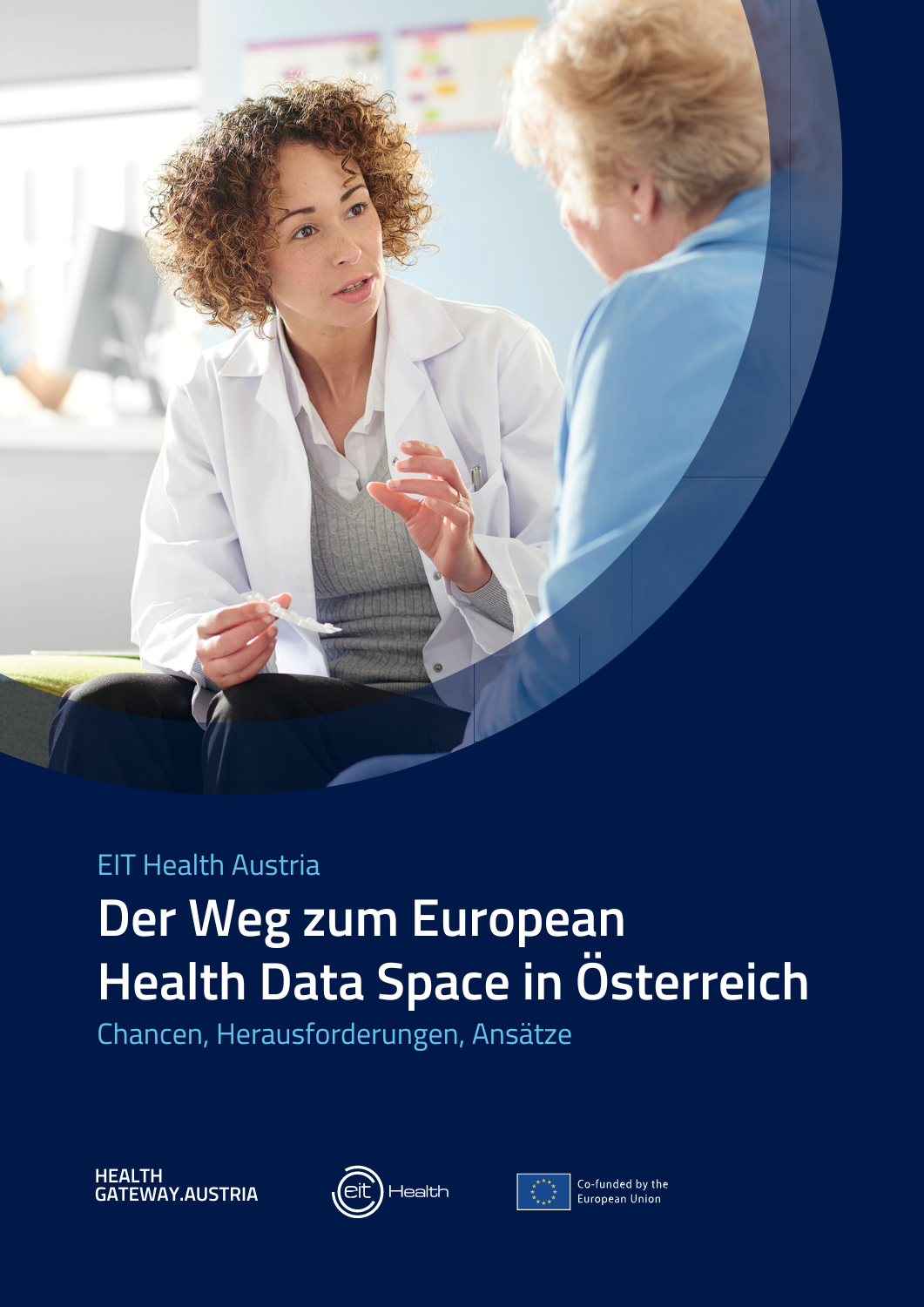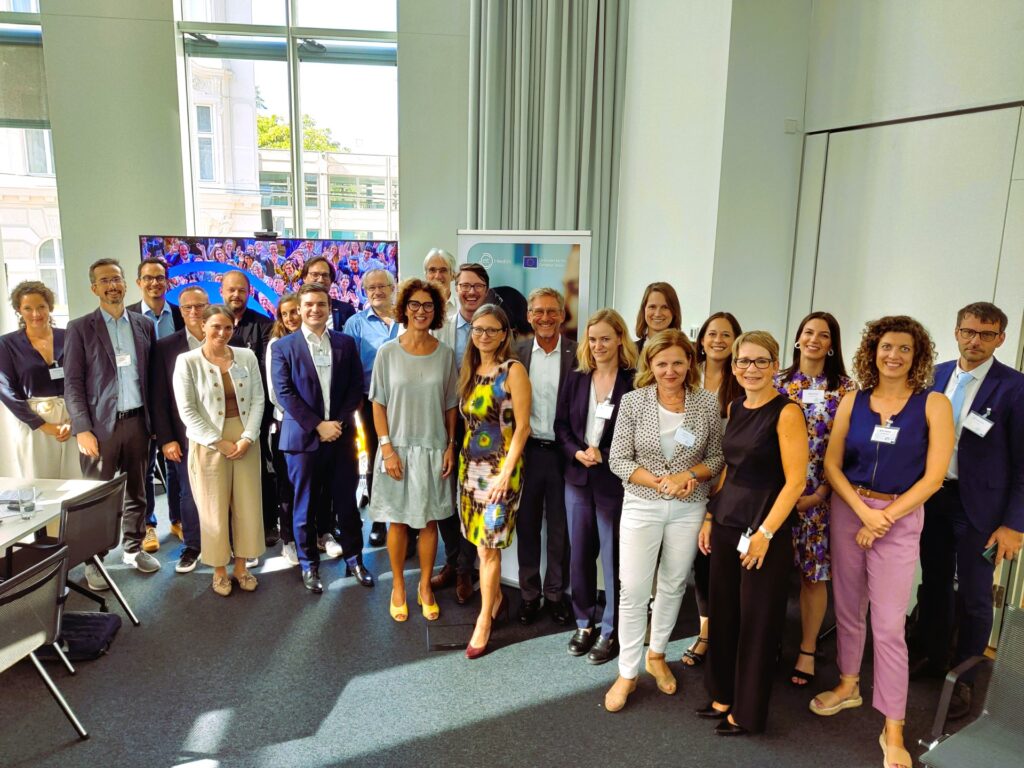10th October 2024

EIT Health Austria presents the Austrian 2024 EHDS report at the PRAEVENIRE Gesundheitstage in Eisenstadt this week. Download the report today, to find out more about Austria’s path towards a European Health Data Space (in German).
Do you want to jump straight into the details? Download the report here (in German).
As the EU is on its way to establish the European Health Data Space (EHDS), Austria is in a unique position. Its national electronic health record, ELGA, has been in use for over a decade and covers almost the entire population. This provides a strong foundation for using data by patients and healthcare professionals across borders. However, for research and policymaking, infrastructure and processes are still lacking, despite having a lot of electronic health data.
In the years ahead, Austria, as a comparatively small EU Member State, will need to seek collaboration and synergies at European level to develop a viable EHDS infrastructure. EIT Health Austria participated therefore in a series of ten national and regional roundtables across Europe. These were initiated by the EIT Health Think Tank to assess the maturity of different EU regions and Member States for the implementation of the EHDS with a particular focus on the secondary use of health data (read more here). The aim: to gather experiences and insights from the practice of EIT Health Partner organisations and other relevant stakeholders and institutions in the EU health innovation system in light of introducing the EHDS. This initiative was overseen by a European steering committee of experts from various countries, chaired by Dr Andrzej Rys, University of Oxford, EU Fellow and Scientific Advisor at the EU Commission’s Directorate-General for Health and Food Safety.
For Austria, EIT Health Austria organised the round table in autumn 2023, in addition to written feedback in the following months. The final report combines the personal expertise, experiences and perspectives from Austria-based scientist and researchers, healthcare professionals, health data managers, IT experts, (bio-)medical engineering and patient organisations from following organisations: AIT Austrian Institute of Technology, AUSTROMED, CANCOM Austria AG, ELGA GmbH, Future Health Lab, Gesundheit Österreich GmbH, IT-Services der Sozialversicherung GmbH, KAGES Steiermärkische Krankenanstaltengesellschaft m.b.H., Landesinstitut für Integrierte Versorgung Tirol, Loidl Consulting GmbH, Ludwig Boltzmann Gesellschaft, Medical University of Vienna, Statistics Austria, Research Institute Digital Human Rights Center, Österreichischer Gesundheits- & Krankenverband, University of Vienna and Zuehlke.

While the content of the report does not reflect aligned recommendations of those organisations, it summarises viewpoints of their individual experts on the following EHDS topics:
- governance
- capacities and competences
- resources and funding
- data quality
- data in the cycle: The relationship between primary and secondary use
- awareness, education and communication: promoting the data culture in the healthcare sector.
Key Takeaways
The country’s federal political system and organisation of healthcare appear to have impeded effective data-sharing in the past, and are expected to shape the practical application of the EHDS in the national context going forward. As the distributed structure of the Austrian health data landscape will almost certainly remain, significant efforts and investments will be needed to improve the interoperability and standardisation of the data throughout the system, and especially in healthcare, where certain categories of data in the community and nursing care settings remain entirely inaccessible for research. Obtaining the kind of high-quality data that is suitable for secondary use is a resource-intensive and costly undertaking for which even larger healthcare institutions are ill-equipped to assume responsibility, and which healthcare professionals cannot be expected to prioritise over their primary task of delivering optimal care to patients. The implementation of international data standards in all areas of medical reporting, as well as the deployment of technologies capable of simultaneously supporting the clinical care process and facilitating structured data capture from the outset, will therefore be important levers to reconcile the interests of primary and secondary users within the EHDS.
Not to be underestimated is the commitment that will be necessary to inform, educate and convince key stakeholders, especially citizens, patients and healthcare professionals, of the rationale for, rules and benefits of the new framework. Trust in the EHDS, and thus its success, will hinge on the ability of its model of data governance to translate societal values and personal preferences into secure, transparent and ethical data-sharing processes that all citizens can easily understand and participate in. The EHDS’s long-term viability, meanwhile, will be predicated on establishing a sustainable supply of new and specialised skillsets both to operate the system and to interact competently with its primary and secondary use facets. As much as possible, the professional qualifications that will be required and the basic skills that will need to be developed across all of society in the future, should be anticipated and invested in today.
Download the report “Der Weg zum European Health Data Space in Österreich” here: https://urlr.me/cYLKs (in German)
This report is a part of the HealthGateway.Austria project. The HealthGateway.Austria project is funded by the FFG. www.ffg.at | www.healthgateway.at
An early version of the report was already presented at the 2024 dHealth conference in Vienna.
When Ideas Meet Ambition - How Impact Happens at EIT Health

How Impact Happens at EIT Health
EIT Health and BioPhoT Sign Memorandum of Understanding to Strengthen Health Innovation Collaboration

Strengthening health and life-science innovation in Latvia

